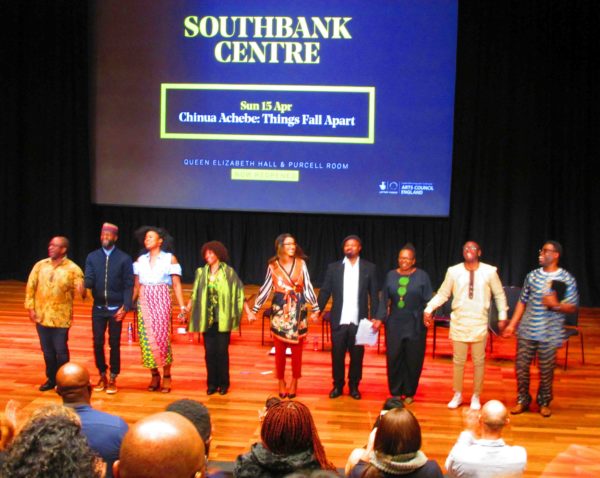
60 years on from the first publication of Things Fall Apart, I was excited to be in Queen Elizabeth Hall at London’s Southbank Centre to pay homage to Chinua Achebe and to enjoy a performance of his masterpiece by a stellar group of readers. A seven hour session of the finest literary entertainment, presented by an esteemed collection of novelists, poets, Nollywood actors, publishers and editors.
Ben Okri introduced the event by describing Things Fall Apart as an important cultural development. He praised Achebe for his portrayal of precolonial African life from within, as a novel and not a polemic — a story of a people being suppressed and a way of life being destroyed under colonial rule. Okri noted that Achebe recognized the internal fault lines too. Things were collapsing from within as well as being pressured from without.
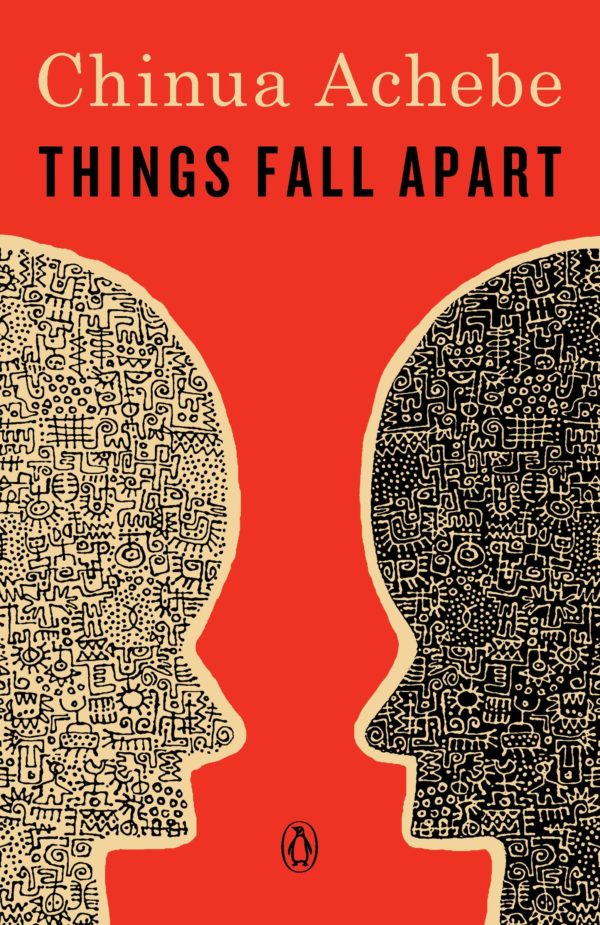
For Okri, the story is “a magical thing that speaks to us in new times and goes on speaking”. Hence, it has relevance now, for Britain and Brexit. But even more so for Africa, whose resources are still being removed to faraway places. “We are still here”, he added, but: “we need to remember that at any time things can fall apart” and we “must work tirelessly for unity”.
With some early audience engagement, Okri adapted Okonkwo’s chant, converting “Umuofia kwenu?” into “Africa kwenu?”, which I translated as “Are you there, Africa?” The response was “Yaa!” every time.
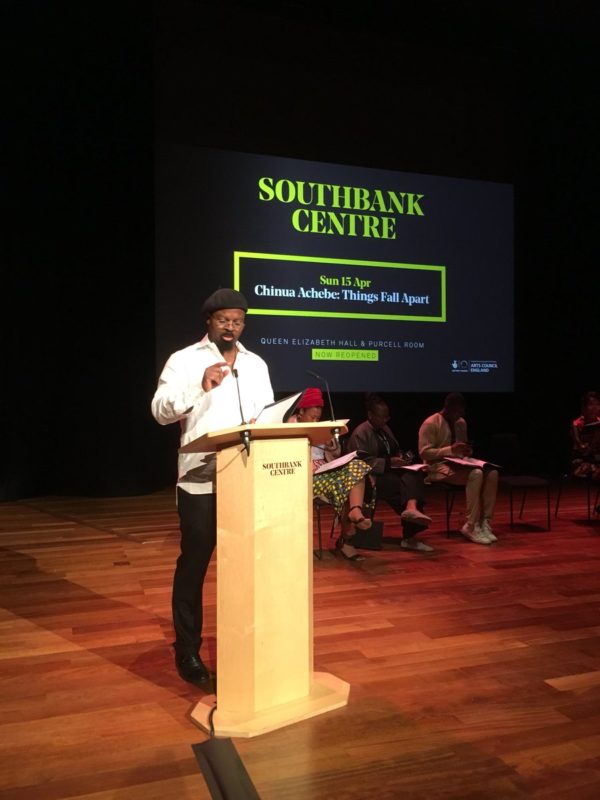
The performance
One by one, the cast stepped forward to entertain us with a chapter from the novel, right through to its conclusion. Ben Okri, with a rich, deep voice, was measured and thoughtful. Jennifer Nansubuga Makumbi reached into the characters and switched between them effortlessly. Adesua Etomi brought us Nollywood glamour, delivering her lines with a hint of mischief. All the readers offered something extra, with gestures, rolling eyes, pauses and interjections. The real star, though, was Achebe. The readers were the channels for his words, his wisdom, his story. Together, the author and readers created literary magic.
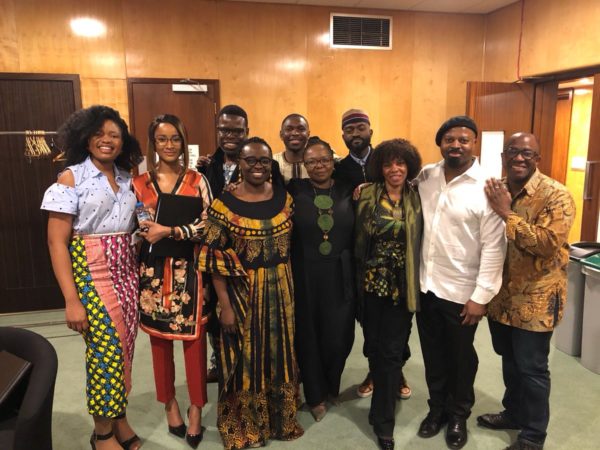
Humour
I never realised that there is so much humour in Achebe’s work. I’m sure he would have been thrilled at so much entertainment being gleaned from his tale, which is traditionally regarded as predominantly serious and tragic. There were chuckles and bouts of rip-roaring laughter along with moments of disquiet and shakes of the head at severed heads, beatings, and sacrifices.
Femi Elufowoju Jr gave us comic voices and hand signals, and raised both eyebrows at “a man with nine wives and thirty children”.
Yomi Sode gained a big laugh with the line “who killed my banana tree?” Which was very funny, until the laughter continued in the audience when Okonkwo proceeded to beat his wife.
When the white man came on the scene in the village, Chibundu Onuzo pinched her nose and read with a hilarious twang, as directed by the author. This could almost certainly not be done the other way round, i.e. British readers putting on funny Nigerian voices. That is understood and accepted.
As the tale reached its darkest, Yomi Sode reveled in the escalating ridicule.
Here is Achebe on Mr Smith, the missionary: “He saw things as black and white. And black was evil”.
Yomi simply had to interject in his own reading at this point:
“I feel like it’s a live Nollywood thing”. This was contemporary, relevant, and playful.
“What a donut!”, Yomi added, after telling us that white man Enoch had unmasked an egwugwu.
Masculinity Challenged
There were many mentions of yams, and yam seed. Fitting for a seminal work that focuses on maleness and virility. Yet Okonkwo, the almost Herculean figure, famous for drinking palm wine from a human skull, is insecure. He is terrified of turning into his father and equates weakness with femaleness. Lucian Msamati repeatedly voiced Okonkwo saying, of Ezinma,
“She should have been a boy.” Groans all round.
Okonkwo, beset by “manly sorrow”, convinced himself that his father Unoka and his son Nwoye were effeminate.
The Role of Women
This really got going with Adesua pausing to allow us to laugh at Okonkwo being “provoked to justifiable anger” by his youngest wife for plaiting her hair rather than cooking the dinner. “Yeah!”
There were many lines on women and cooking. Did Achebe overdo this? Or was it Okonkwo? All the female readers reacted to the chauvinism in the village. There were more laughs at “sixteen and just ripe for marriage”, “women and their troubles”, “one of these days your jigida will catch fire” and a line about bride price.
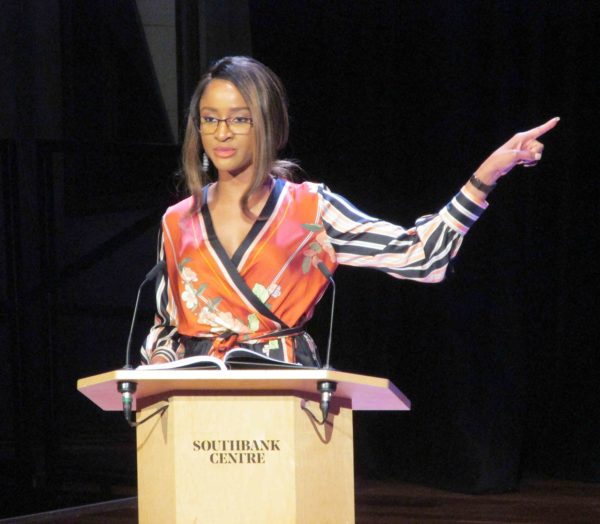
Sex was the subject of the biggest laugh of the afternoon:
When talking about upside-down customs, minor character Machi opines:
“You might as well say that the woman lies on top of the man when they are making the children.”
Quite so. Later, there was mild titillation when it was read that Ekwefi ran away from her husband to live with Okonkwo.
Music
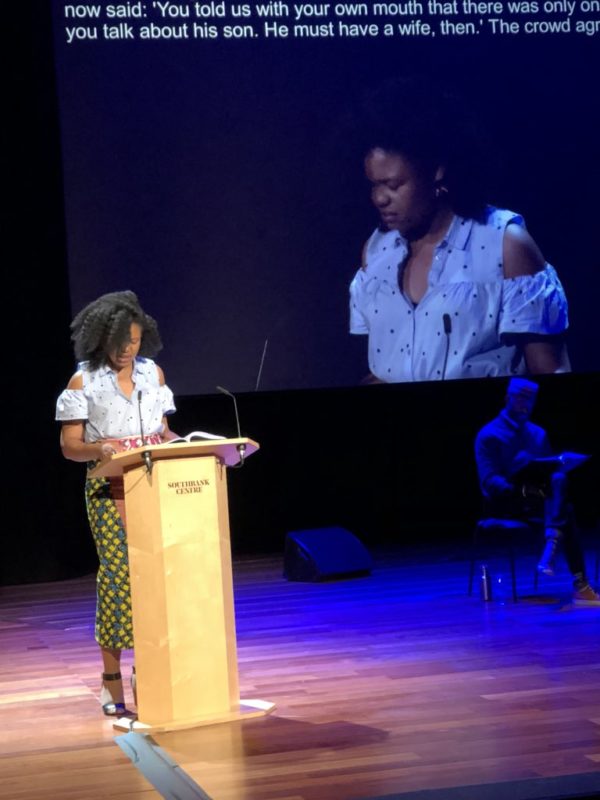
The loudest cheer of the day came for Chibundu Onuzo for her rendition of Ikemefuna’s song:
“Eze, elina, elina!
Sala
Eze ilikwa ya
Ikwaba akwa oligholi
Ebe Dandanechi eze
Ebe Uzuzu nete egwu
Sala”
Achebe liked his readers to translate, so have a go!
@ChibunduOnuzo beautifully renders Ikemefuna’s song from Achebe’s Things Fall Apart @southbankcentre #ThingsFallApart60 pic.twitter.com/59CdezTGP9
— Ike Anya (@ikeanya) April 15, 2018
The White Man and Religion
Chibundu also got the second biggest laugh, being the first to read the word ‘buttocks’ as an epithet for white men. Much fun was had at the expense of the white god who must have had a wife if he had a son. Adesua shuddered at the white man’s dual assault on the indigenous people with religion and education.
Violence
Violence takes many forms in the story; beating, decapitation, the murder of Ikemefuna, tribal warfare, as well as the beatings and the murders carried out by the white colonialists. When Okonkwo slayed the white messenger with his machete, my neighbour in the stalls, who had been murmuring with assent all along, relished this final act of tribal strength and revenge. “Nice one”, she called out. I felt slightly uncomfortable at that point. But this was a time to celebrate, not to fall out or take offence.
This apart, I sensed the warmth of the audience. I heard the frequent hum of appreciation for well-loved lines, from people who knew what to expect and wanted to share their joy. This seemed to constitute a collective sense of ownership.
“He who brings kola brings life.”
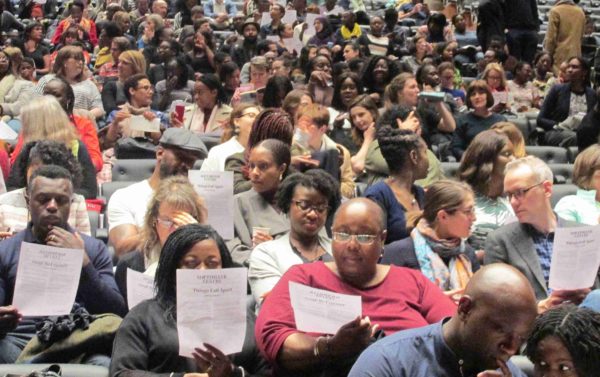
One more thing
All the readers said ‘machet’ not ‘machete’ as spelt in my Everyman edition of the story. Puzzling. If you’re reading this, Ellah Allfrey, it’s a small detail but I would love to know why. You abridged the story so well that I hardly noticed anything missing, apart from this final ‘e’. For me this was abridged too far.
Final reflections
“All of Achebe’s work is, in some way, about strong communitarian values, the use of language as collective art, the central place of storytelling and the importance of symbolic acts and objects in keeping a community together” (Chimamanda Ngozi Adichie)
This was a fitting book, then, for a collective reading. We were all connected.
The story was a clarion call to remind fellow Africans to stand together, and to let the west know that African stories by Africans must be must be told and listened to. Achebe was also recording traditions, even if he could not preserve them all.
Ben Okri had the privilege of closing the reading. He told us of the white District Commissioner, who wrote in his journal:
“One of the most infuriating habits of these people was their love of superfluous words, he thought.”
Well, Achebe’s story, at 146 pages, is just right in length, perfectly balanced in three parts, with no unnecessary words at all.
Going right back to the start of the event, Okri summoned the spirit of Chinua Achebe. He called for Achebe’s warmth of spirit and his gentle humour, recognising him as a distinguished ancestor. With Achebe’s help “we shall not fall apart, but come together.”
And so we remember and move forward.
“Umuofia kwenu?”
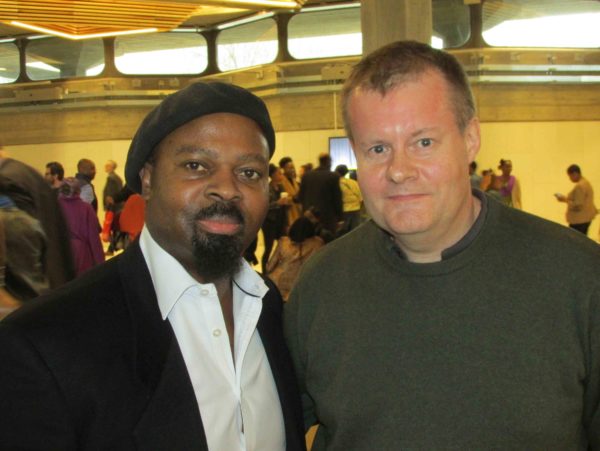
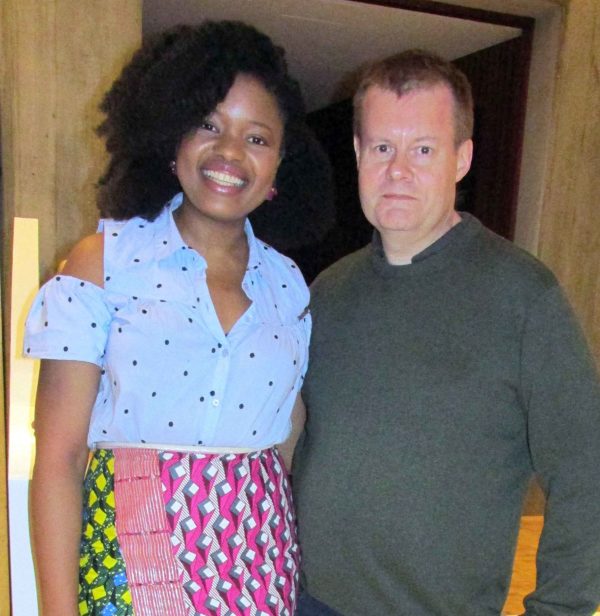
Full cast of Readers
Ben Okri – Novelist and poet, Man Booker Prize-winner
Lucian Msamati – Film, television and stage actor
Femi Elufowoju Jr – Actor, performer and director
Adesua Etomi – Nollywood star
Yomi Sode – Poet, performer and playwright
Ellah Wakatama Allfrey – Editor, critic, broadcaster and publisher
Chibundu Onuzo – Novelist, musician
Jennifer Nansubuga Makumbi – Novelist and short story writer
Margaret Busby OBE – Publisher, editor, writer and broadcaster
Inua Ellams – Poet, playwright and performer
***********
About the Author:
Eddie Hewitt: I have a passion for Culture and the Arts. I run the Connected Cultures website, dedicated to all forms of creative expression, with a strong social element wherever possible. Aspiring to develop my creative flair, I also have a keen sense of history and responsibility, and how we are all linked. My main cultural interests are African literature (I was short-listed in the Brittle Paper “I love African Literature” writing contest in 2016), Shakespeare, Thomas Hardy, contemporary art and Star Trek Discovery. I also like to support and encourage fellow creative spirits.






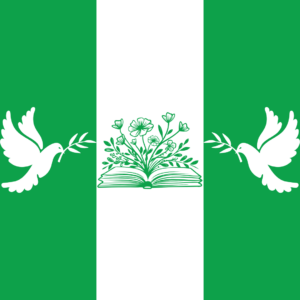


Siobhan Leftwich October 15, 2021 19:22
Is it possible to purchase a recording of the reading?